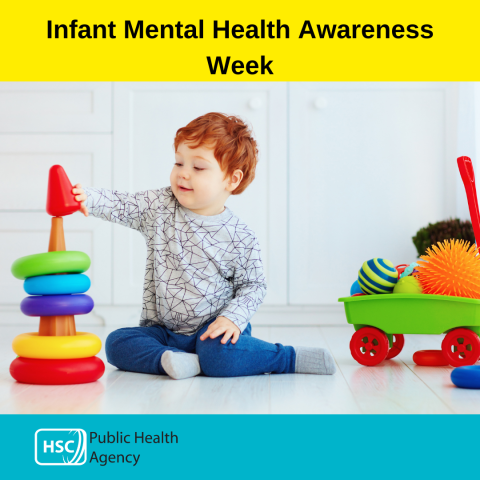What is infant mental health and why does it matter so much?

During Infant Mental Health Awareness Week, which will take place from the 12th–18th June, the Public Health Agency (PHA) is raising awareness of why infant mental health matters so much and the importance of ‘Bonding Before Birth’.
Bryan Leonard, Health and Social Wellbeing Improvement Manager and lead for Early Years at the PHA, said: “Infant mental health describes the social and emotional wellbeing and development of children in the earliest years of life. This includes their ability to form close relationships, recognise and express emotions and explore and learn about their environment.
“Research shows that the experiences and relationships we have in the earliest years of our lives, including before birth, impact on the development of our brains. Stress and adversity experienced during pregnancy can have a negative impact on babies’ physical and mental health as they grow, but this doesn’t have to be the case.
“The benefits of children having a positive start in life, and being properly equipped with the emotional and social skills that they will need, will mainly be seen in the longer term. These benefits will stretch beyond health to educational attainment, employment, and reducing numbers entering the criminal justice system.
One of the best ways we can provide a positive start in life is to bond with our babies from early on – it is an important human instinct that gives babies a sense of security and self-esteem. Bonding also helps parents feel connected to their newest family member and begins to happen even before the baby is born.”
Babies brains are wired for connection. During pregnancy and infancy, it is obvious how physically reliant babies are on their parents and caregivers. They are also socially and emotionally connected to us in so many fascinating ways. The way we interact with babies and infants literally shapes their brain development. This occurs particularly during pregnancy, and continues up to the age of three years, when our brains are growing at the fastest rate. We now know that ‘mirror neurons’ in the brain mean that how we act and interact with our children explains their ‘copy-cat’ behaviours. It all sounds like a huge responsibility but in fact, it’s the small, day-to-day interactions with babies and infants that make the greatest difference.
Siobhan Slavin, Nurse Consultant in Early & School Years at the PHA said: “Your baby can hear you from at least 16 weeks, and perhaps earlier. Babies hear their mother’s voices most clearly, but anyone can talk and sing to them – your baby will love to hear from anyone. This helps your baby to get to know voices, which will help them feel safe and secure, tune up their hearing and get ready for when they will eventually talk. Talking and singing to your baby is also good for their development. Find a quiet time when you and your baby can focus on each other and talk or sing to them, it doesn't matter what music or song – if you like it, so will your baby. If you feel a bit silly talking to the bump, don’t worry – lots of people do. If you can’t think of anything to say, just chat about the day or share a story.
“From around three months pregnant, it’s safe for you to gently massage your bump, and this can be a great way to bond with your bump and baby. Many mums-to-be find this to be a relaxing way to unwind and bond with their bump, whilst it can also be a nice way to include your partner and other family members in the bonding experience.
Bryan concluded: “Infant mental health is not about perfection. It is hugely important that we don’t create unrealistic expectations for ourselves, our babies, and our relationships. Pregnancy and early parenthood can be exhausting, and we all learn as we go. If we can be consistent and predictable in our responses most of the time, we are winning! Our goal is to enable as much attuned ‘serve and return’ interactions as possible, and to try to find a way of repairing and reconnecting when things go wrong.
“If your mood is persistently low and you are more tearful or irritable than is manageable, ask for help from your midwife, GP, or health visitor as early as possible. You deserve it, and so does your baby.
“Anxiety and depression can affect anyone at any time. That includes Dads too. The earlier you get help the better.”
For more information on early years and for information on support see ‘The Pregnancy Book’ available at www.pha.site/Pregnancybook and ‘Birth to five’ at www.pha.site/Birthto5
